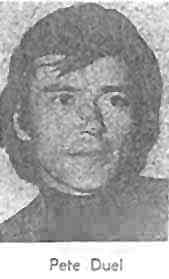- SMITH AND JONES--WITHOUT SMITH
By Cecil Smith (Column Writer)
- Los Angeles Times, January 5, 1972
It was a dark and terrible
thing to come home to. I had been communing in the white serenity
of the Colorado mountains above Snowmass-at-Aspen, walking in
"velvet shoes," as Elinor Wylie put it, glorying in
the purity of that place, the grandeur of those massive mountains
that seemed in their august dignity disdainful of the skiers
clustered like flies on their slopes. Then home and Pete Duel's
death.
It was "Richard Cory" in fact.
Pete fluttered pulses when he said, "Good morning."
And he glittered when he walked. And as in the Edwin Arlington
Robinson poem, we people on the pavement envied him "and
went without the meat and cursed the bread while Richard Cory
one calm summer night went home and put a bullet through his head...."
On the set of Alias Smith and Jones on
the Universal backlot Monday, it was, in effect, business as usual.
After some frenzied rewriting, the episode which was being filmed
when Pete ended his young life was being completed--a Smith and
Jones without Smith.
By midafternoon from the offices of executive
producer Roy Huggins' Public Arts Productions the announcement
came that Roger Davis had been signed to costar with Ben Murphy
(Jones) in the final four episodes for this season of the series.
That's an ironic note.
Huggins made a pilot for a comic western
series for ABC in the tradition of his famous Maverick that was
called "The Young Country" and starred Davis, a lanky,
likeable actor out of the eerie soap opera Dark Shadows. Pete
Duel at the time was jubilant because he was the villain in the
piece. He'd escaped the series trap once again.
A Word Pete Hated
Only he didn't. ABC didn't want Davis,
they wanted Duel. So Smith and Jones was invented under Huggins'
supervision (with a large assist from "Butch Cassidy and
the Sundance Kid") to star Pete. Now Davis replaces him.
I can see Pete's wry grin.
You don't just drop a series. You can't--contractually.
Now there's a word Pete hated. Contractually. He could spit it
out, divided into syllables, and let it lie there in the dust
squirming.
"Contractually. I have to do this
series--or some other trash," Pete told me last month.
"He was making the all-star episode,
"21 Days to Tenstrike," that will be shown Thursday
night. It was gussied up with such actors as Walter Brennan, Steve
Forrest, Linda Marsh, Glenn Corbett, Pernell Roberts--even Dick
Cavett as a western sheriff--to offer competition to the My Three
Sons hour special Thursday, inaugurating its new CBS slot. Such
things Pete felt were no concern to the actor.
He was a bitterly depressed young man,
feeling that any TV series "is a big fat drag to any actor
with interest in his work" Pete felt thwarted and frustrated.
He said he'd been trying "to patch together my private life
which fell apart with the help of this series." He was bitter
about the series, any series.
Out of Proportion
The official reports say he was despondent
about his drinking. Yet at work on dozens of occasions that I
saw him he was always clear-eyed, steady, a professional. His
boozing, such as it was, was elsewhere. Yet that's a symptom,
not a cause.
His sister Pamela Deuel, with whom he
was very close, said last weekend that there were many, many problems
Pete had, that he magnified them out of all proportion, that "he
couldn't cope." Son of a Rochester doctor, Pete was the first
of his family to eschew medicine for the stage; his brother Geoffrey
followed and Pamela is a singer.
The most ironic twist of all is that Pete
felt the only satisfying work he'd done in the last year was playing
Squire Talbot in Percy MacKaye's play of witchcraft and demons,
"The Scarecrow," on Hollywood TV Theatre. "It's
the only thing I've done in a long time that I've really looked
forward to seeing," he told me.
It's on KCET next Monday night.
Back
to Articles List
